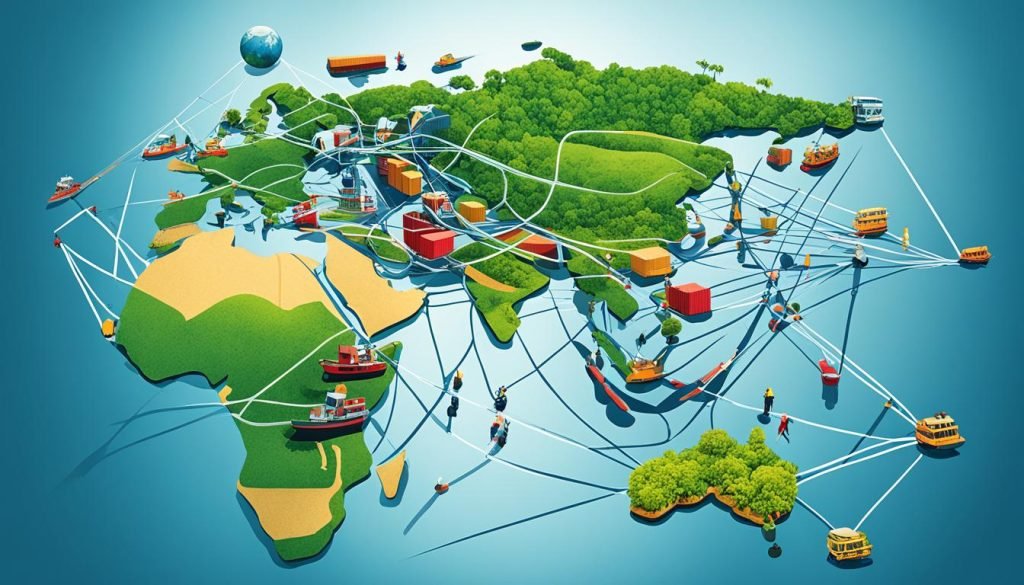Ethical supply chain management is key in today’s business world. It focuses on how products are made and where materials come from. This includes making sure workers are treated fairly and the environment is protected. Companies play a big part when they choose to follow ethical practices. They help in making sure everyone along the chain is treated right and that the planet is cared for.
It’s not only about treating workers well, but also about protecting the environment. Ethical supply chain management looks at many important issues. This includes making sure companies work together for fair trade, care for the planet, and keep their workers safe. If a company doesn’t care about being ethical, it can hurt their image, face legal issues, and lose money.
Managing a global supply chain can be challenging. To do it right, companies need to focus on ethics. This means working with partners that care about the same things. By taking these steps, companies can build trust, keep their good name, and help their communities.
Key Takeaways
- Ethical supply chain management involves sustainable sourcing practices and responsible sourcing strategies.
- Transparency and fair competition are fundamental ethical considerations in supply chain management.
- Upholding ethical standards in the supply chain promotes brand reputation and financial performance.
- An ethical supply chain contributes to positive social impact and attracts talented employees.
- Organizations must adapt to emerging ethical issues, such as human trafficking and data ethics, in their supply chain management.
Ethical Issues in Supply Chain Management and Procurement
Supply chain management and procurement rely heavily on ethics for fair and sustainable practices. Key ethical issues include human rights, labor conditions, transparency, fair competition, environmental sustainability, and safety.
Human rights and labor conditions are top concerns for companies. They often get materials from places with different work laws. It’s essential for companies to make sure their partners treat workers fairly and protect human rights.
Transparency is vital in how supply chains are run. Companies should share their practices openly and expect the same from who they work with. This honesty builds trust and ensures everyone is treated fairly.
Fair competition is critical for proper supply chain ethics. It means not playing favorites or taking bribes when picking suppliers. With true competition, all suppliers get an equal chance. This keeps the process honest and fair.
Being eco-friendly is now a must in supply chain ethics. Companies need to find materials in ways that don’t harm the planet. They should also cut down on waste and reduce pollution. These efforts show a company is serious about helping the environment.
Safety should always be a top priority. This means making sure workers and products are safe. Companies need to do all they can to stop accidents and keep their supply chains from causing harm.
“Ethical issues, ranging from human rights and labor conditions to sustainability and safety, must be at the forefront of every organization’s supply chain management strategies.”
Tackling ethical issues head-on is crucial for any business. They should set firm rules that encourage fair and ethical behavior. Doing so helps businesses last longer, build trust, and make a positive impact.
The Relationship Between Ethics and Supply Chain Management
Ethics and supply chain management go hand in hand. Ethical practices are vital for supply chain success and its ongoing strength. They uphold fairness, open dealings, and ethical business behavior.
Fair trade practices set out ethical rules for all involved in the supply chain. These rules level the playing field and guard against unfairness. They protect workers’ rights, ensure they get fair pay, and push for eco-friendly actions.
Positive supplier relations are crucial for a good partnership. Fair treatment, keeping to agreements, and ethical behaviors are key here. This builds strong and sustainable connections in the supply chain.
Working ethically in all locations, including foreign ones, is a must. Businesses should avoid acting corruptly and protect human rights. These actions help build trust, improve performance, and ensure accountability across the supply chain.
The Benefits of an Ethical Supply Chain
Creating an ethical supply chain helps companies in many ways. It makes their brand reputation better. When a company is ethical, consumers are more likely to stay loyal and pick it over others. A study from The Harvard Business Review even showed people would pay 20% more for ethical products.
Positive social impact is another big win. Ethical companies treat their workers fairly. They pay a fair wage and keep workplaces safe. This helps the workers and the areas they live in.
An ethical supply chain cares about the planet, too. It picks suppliers who also act responsibly. They lessen waste and pollution. This effort is noticed by people who want to protect the environment. It builds stronger bonds with the brand.
Workers want to work for these ethical companies. A PwC study found 88% of young employees care about this. Over half would leave a job that didn’t share their values. Being ethical helps attract and keep these employees who value making a positive impact.
A huge plus of being ethically minded is lower risks. By steering clear of shady supply chain practices, companies prevent a lot of problems. This includes fines and bad press. Trust with customers and others gets stronger.
Overall, an ethical supply chain is a game-changer. It doesn’t just make sure a company plays by the rules. It also boosts its brand reputation, makes more money, and betters the world. It welcomes great employees and helps build a fairer future for all.
Key Benefits of an Ethical Supply Chain:
- Enhanced brand reputation
- Improved financial performance
- Positive social impact
- Talent attraction and retention
- Risk mitigation
New Ethical Issues in Supply Chain Management
Supply chain management is changing on a worldwide level. This change brings new ethical issues for companies to deal with. Human trafficking and data ethics are two major concerns.
1. Human Trafficking
Human trafficking is still a big issue in many places. It poses serious ethical problems for supply chains. To fight this, companies need to be careful.
They should make sure their suppliers are ethical. This means checking how these suppliers treat their workers. Companies must also watch over their suppliers to catch any bad practices.
Preventing trafficking helps companies act ethically. It also keeps their brand strong and trust with customers high.
2. Data Ethics
As more technology is used in supply chains, data ethics is becoming more important. Companies have to handle a lot of data responsibly. This means looking after the privacy and security of this data.
Companies need clear rules on how to handle data. They should have ways to get people’s permission to use their data. Data must be kept safe and only shared correctly.
Ignoring data ethics can be bad news. It can hurt a company’s reputation and even get them in trouble. To avoid this, companies need strong rules and to regularly check if they are doing the right thing.
Good data ethics not only avoids risks but also helps companies earn trust. Trust comes from customers and those involved in the supply chain knowing they are careful with data.

Summary
Supply chain management is always changing. To keep up, companies must watch for new ethical issues. This includes fighting human trafficking and dealing with data in a responsible way.
Dealing well with these issues makes companies more ethical. It also helps protect their good name. And it makes the whole global supply chain better and fairer for everyone.
Conclusion
Creating an ethical supply chain does good and makes sense for companies. It helps them keep a strong brand, improve their financial situation, and do good for society.
By taking on ethical practices, companies ensure their supply chain is honest, treats workers fairly, protects the environment, and sources materials responsibly. This makes them look good, keeps their customers happy, and their employees too.
Working towards an ethical supply chain takes time and cooperation. Companies join hands with suppliers to build a better, fair future. This effort helps reduce risks, deepen relationships, and create positive effects on the business and the world around us.
FAQ
What is ethical supply chain management?
What are the key ethical issues in supply chain management and procurement?
How are ethics and supply chain management interconnected?
What are the benefits of implementing an ethical supply chain?
What are some emerging ethical issues in supply chain management?
Why is building an ethical supply chain important?
Source Links
- https://www.the-future-of-commerce.com/2020/01/22/ethical-supply-chain-definition-stats/
- https://www.apu.apus.edu/area-of-study/business-and-management/resources/ethical-issues-in-supply-chain-management-and-procurement/
- https://www.linkedin.com/pulse/doing-right-thing-importance-ethical-supply-chains-rafael-a-vela-



